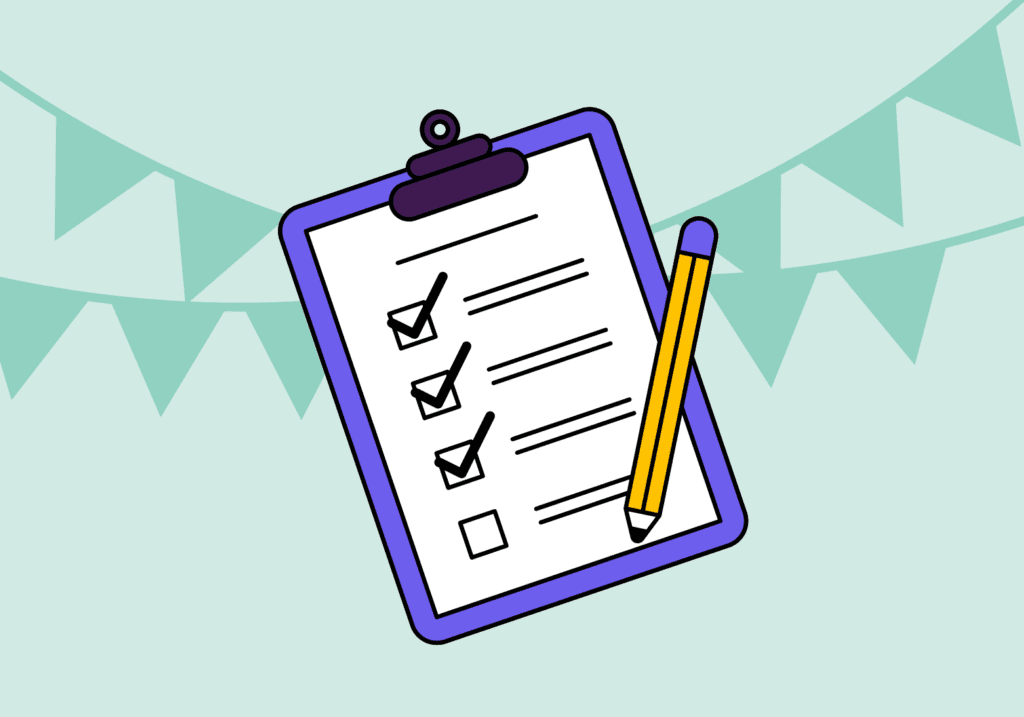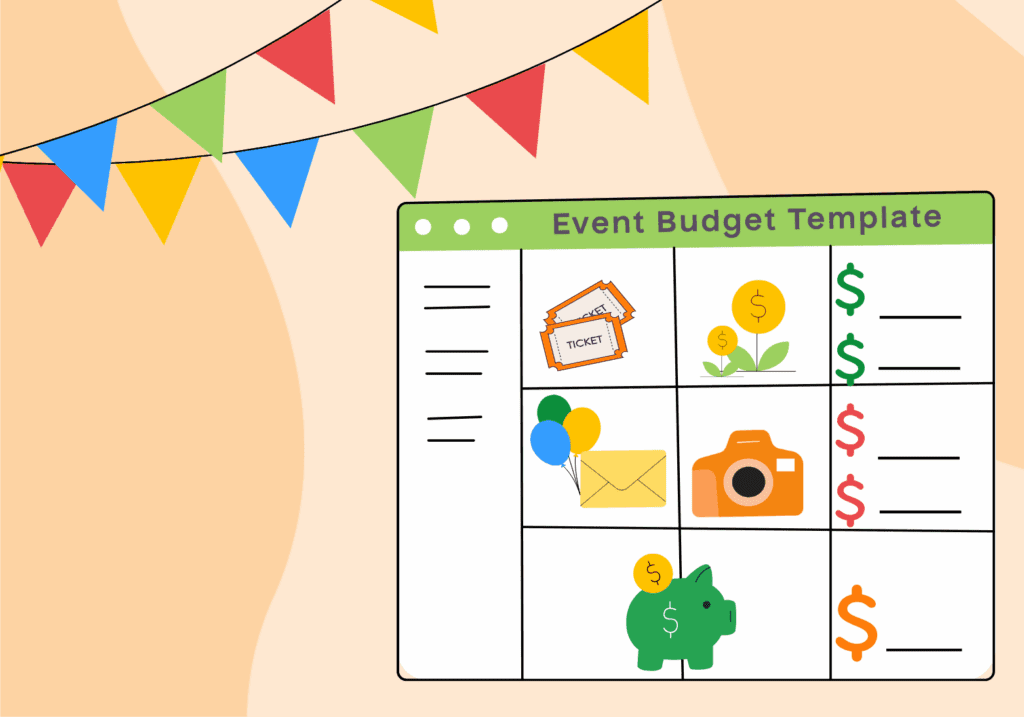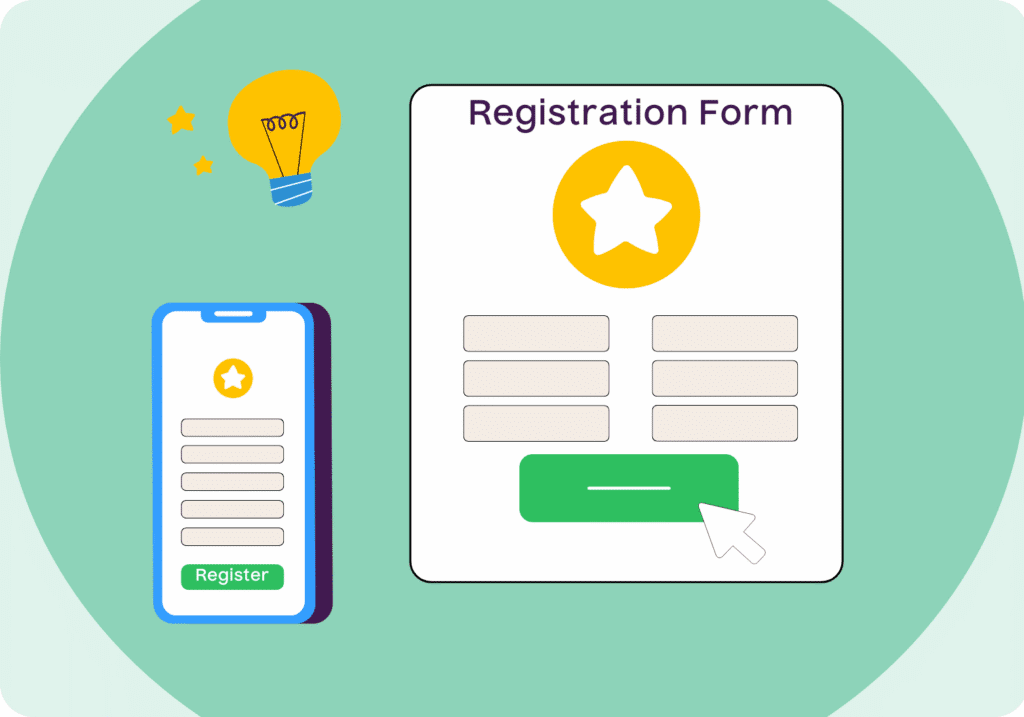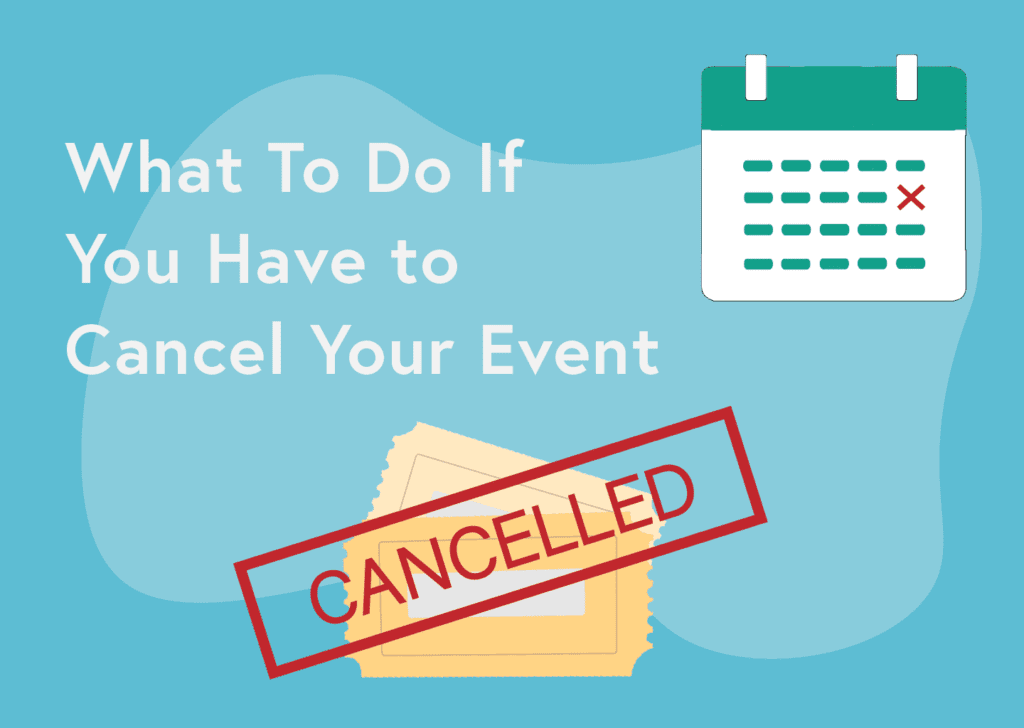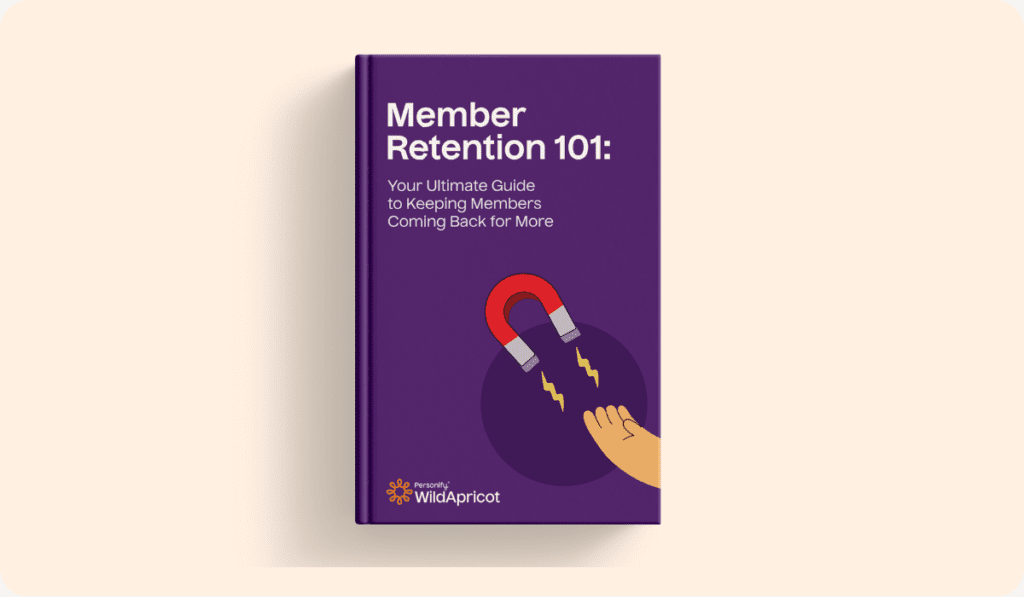Are you new to planning events and want a little help?
Or are you looking for an easy process for your team to follow while planning an event?
Whether you’re running an in-person, hybrid or virtual event, you’re in the right place. This blog post will help you figure out everything you need to plan and execute for your next event.
And if you want to learn how to plan an event from start to finish, check out our entire guide here.
Want a printable copy of this event planning checklist? Fill in the form below!
Download Your Copy of the Event Planning Checklist
(Excel, Word, PDF)
Make planning your next event a breeze with this ultimate event planning checklist. Simply fill out the form below to download your copy.
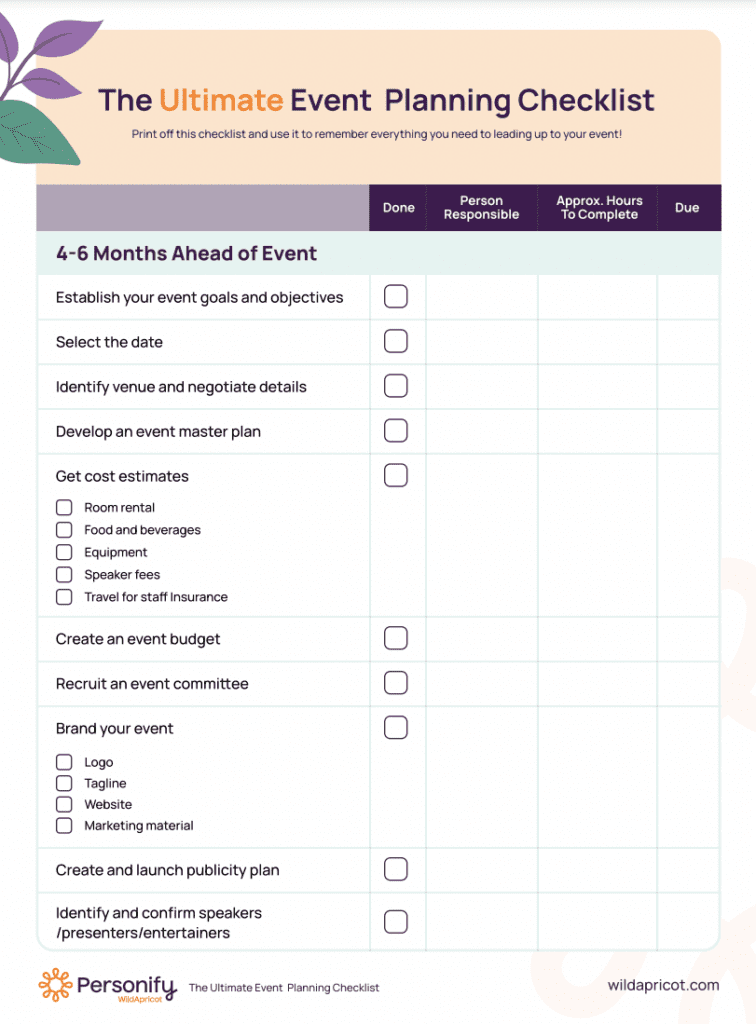
What does an event checklist include?
When you create your event checklist, it should cover the essentials. That includes:
- Date
- Location
- Type of event
- Goals
- Budget
Of course, there’ll be some parts of your event that won’t fall exactly into these categories, but these must-haves are an important jumping off point. Which leads us to my next point…
What are the 10 steps to plan an event?
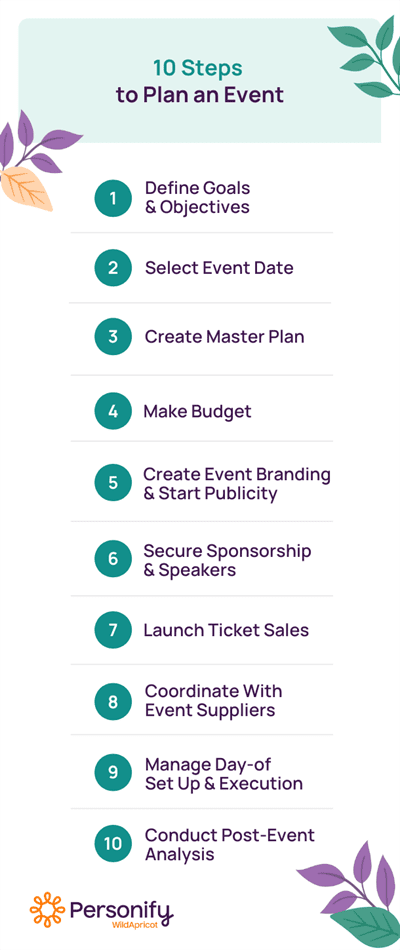
The top ten most important steps in planning any event are:
- Set your event goals and objectives.
- Select your event’s date.
- Develop an event master plan.
- Create an event budget.
- Brand your event and begin publicity.
- Arrange sponsorships and speakers for your event.
- Launch ticket sales.
- Coordinate with event suppliers (catering, equipment, etc).
- Manage event day set up and execution.
- Evaluate the success of your event!
To help you out every step of the way, I’ve broken down these steps into a few different sections by date, which you can see in the table of contents to the side. This will help you figure out when to do certain tasks. Of course, the earlier you can start working on your event, the better — that way you’ll be as prepared as possible when any issues come up (as they probably will).
And remember: your event can range from a small workshop to a gala fundraising event. Whatever your event may be, this checklist is the perfect place to start your event planning.
The First Steps in Your Event Checklist: 4-6 Months Ahead of Event
The further in advance you can start planning, the better — but I’ve noticed that most organizations we work with start planning their big events like galas and fundraisers about 6 months in advance.
Here’s what you need to do to get started:
- Establish your event goals and objectives. Did you want to raise money or awareness? How many attendees are you hoping to get? Establishing it up front will make it easier to gauge the success of your event. (For tips on getting more event attendees, click here.)
- Select the date. And make sure it doesn’t conflict with any other events taking place in your area, or any major holidays.
- Identify venue and negotiate details. What kind of insurance does the venue require? Can you serve alcohol? Determine the requirements before committing.
- Develop an event master plan. Ironing out every detail will help ensure you don’t miss a thing.
- Get cost estimates. Some costs you might need to consider are:
- Room rental
- Food and beverages
- Equipment
- Speaker fees
- Travel for staff
- Insurance
- Create an event budget. Based on the costs above, you’ll be able to determine how much your event will cost — and if you’ll need to reduce any of them!
- Recruit an event committee. This includes selecting an event manager or chair, and establishing sub-committee chairs.
- Brand your event.
- Start building out an event website or pages on your website that describe the event.
- Develop an event logo and tagline.
- Create and launch publicity plan. This includes ensuring staff and/or volunteers are identified to manage specific tasks – e.g., media relations, VIP coordination, printed material design & printing coordination, signage, online /social media, etc.
- Identify and confirm speakers/presenters/entertainers. Who will you need on hand during the event?
- Identify and contact sponsors/partners. Getting event sponsorship can be a huge boost. Start looking within your network first. Contact your existing supporters and contacts. Then use tools to find potential sponsors.
- Determine if you need event registration software to make the process easier. There are a variety of different software tools that can help streamline the event process.
- Determine if you need other event management software. It’s worth looking into an all-in one solution, like WildApricot, that can keep everything organized in one place. This kind of software can tackle everything including event marketing, relationship management, project management, and more.
- Release early-bird tickets. Early-bird registration is a great way to pique interest and get people excited ahead of the event!
- Ensure registration forms are accessible. Make sure that your forms are inclusive. Allow space for preferred pronouns and preferred names.
3-4 Months Ahead of Event: Starting to Ramp Up
Now that you have some of the foundational parts of your event figured out, it’s time to start executing!
If your event is coming up in a few months, you’ll need to start communicating with all the stakeholders outside your organization and continue coordinating with them.
Here’s everything you need covered at this point:
- Build out required documents for your team.
- General to-do lists
- Event goals, objectives, and KPIs
- Budget docs
- Design requirements
- Speaker/presenter/entertainer liaison:
- Finalize presentation/speech topics
- Get bio information, photo
- Travel & accommodation arrangements
- Have contracts signed if appropriate
- Ask speakers to start promoting and sharing it with their network
- Financial/Administration:
- Determine registration fees
- Set up and enable online registration
- Finalize sponsor levels and amounts
- Identify items to be underwritten and accounting tracking details
- Venue and logistics planning:
- Determine and arrange all details re menu, A/V equipment, registration set-up, parking, signage, etc. If virtual, check registration pages, do tech check-ins with speakers, test virtual experiences, etc.
- Review security needs/plan for the event with venue manager
- Investigate need for any special permits, licenses, insurance, etc.
- Assess accessibility requirements (e.g. all-gender restrooms, wheelchair accessibility, etc). If virtual, this may include live captioning, platforms that work with assistive technology, inclusive design on pages, etc.
- Communicate accessibility requirements to staff.
- Follow publicity plan:
- Develop draft program
- Create draft event script (e.g., MC, speaker introductions, thanks, closing, etc.)
- Develop publicity pieces — e.g., newsletter articles and/or ads, radio spots, print blog posts articles for submission to other publications and/or ads, etc.
- Request logos from corporate sponsors for online and printed materials
- Develop and produce invitations, programs, posters, tickets, etc.
- Develop media list & prepare News Release, Media Advisory, Backgrounder and all media kit materials (e.g., speaker info, photos, etc.)
- Create event page on your website
- Enable/create email event notifications
- Create a Facebook event page
- Develop a promo video and post on YouTube and your Facebook page
- Register your event on a variety of online event calendars
- Create some buzz on your blog or member forums
- Determine VIPs and create invitation & tracking document (e.g., spreadsheet)
- Order any desired event swag
1-2 Months Prior To Event: Keep on Going
You’re getting there! At this point, you’re probably spending more and more time focusing on the event and finalizing some details.
- Send reminders to your contact list regarding registration and participation.
- Schedule email reminders the week before, day before, and day of registration closing and event day
- Schedule social media posts promoting registration and participation (frequency may vary depending on channel and audience)
- Reach out again to presenters/speakers regarding:
- Confirming travel and accommodation details
- Request copy of speeches and/or presentations
- Make sure they have key promotion dates in place
- Sponsorship finalization:
- Follow up to confirm sponsorships and underwriting
- Get any promotional materials you’ll be sharing at the event
- Ask sponsors to share event on their promotional channels
- Continue executing on your publicity plan:
- Release press announcements about keynote speakers, celebrities, VIPs attending, honourees, etc.
- Post your initial event news release on your website and circulate to all partners, affiliated organizations, etc.
- Post more details about your event on social media
- Close early-bird tickets
- Release standard pricing on your event management platform.
- Finalize and proofread printed materials.
- Check for copy errors including spelling, punctuation, and grammar. Look out for any brand discrepancies.
1 Week Prior to the Event: The Home Stretch
You’re getting so close!
By this point, the majority of the event details should be confirmed and all that’s left will be final touches, such as:
- Have all committee chairs meet and confirm all details against Master Plan.
- You should also ensure back-up plans are developed for any situation (e.g., back-up volunteers as VIP greeters, additional volunteers for registration or set-up, etc).
- Finalize event script.
- Assign practice sessions for anyone who has a speaking slot.
- Brief any/all hosts, greeters, volunteers about their event duties and timelines.
- Finalize your seating plan.
- Ensure it includes wheelchair-accessible areas and has clear paths through the venue.
- Provide final registration numbers to caterer.
- Make print and online copies of any speeches, videos, and presentations.
- Do a final registration check, including name badges & registration list.
- Depending on when your registration closes, this may not be possible until a few days in advance, but try to finish it as early as possible.
- Determine photo op and interview opportunities with any presenters and VIPs.
- Confirm details with media attendees.
1 Day Before the Event: Almost There
Here are a few last-minute details you might want to remember:
- Confirm media attendance.
- Ensure all signage is in place
- Both around the venue and any other areas in which it’s needed.
- Ensure registration and media tables are prepared
- Stock with necessary items (such as blank name badges, paper, pens, tape, stapler, etc.)
- Ensure there are enough outlets. If not, consider bringing power bars for attendees and your team.
- Ensure all promo items, gifts, plaques, trophies, etc. are on-site.
- Ensure all A/V equipment is set up and working properly.
- Get a good night’s sleep! You’ll need the rest before the exciting day to come.
Event Day: Your Time to Shine
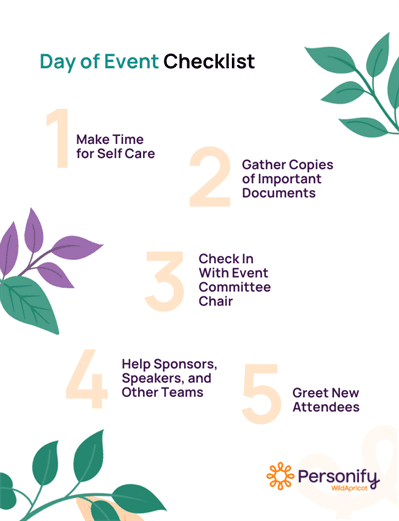
The big day has arrived! Here’s what you have to remember:
- Take a few deep breaths — you got this!
- Schedule time for self care before event starts, whether that be going for a run, getting some quiet time or meditating
- Ensure you have copies of all important materials.
- Instructions, directions, phone numbers, keys, extra parking permits for VIP guests, seating charts and guest lists with you
- Check in with each Committee Chair to ensure their team is on track.
- Also check in with catering and any sponsor teams that are attending.
- Assist sponsors, speakers, and other teams as needed.
- Greet new attendees.
Immediately Following Event:
Post-Event Follow-Up
While you should conduct a thorough evaluation and update your budget, there are other post-event items you should take care of. This includes publicity, fundraising and member development opportunities that you can take advantage of with just a little pre-event planning.
Here’s all the activities you should complete after the event is over:
- Check in with venue. Ensure nothing important was left behind and maintain your relationship with the venue!
- Financial status:
- Gather all receipts and documentation, final registration data, etc.
- Update budget
- Send thank-you’s and acknowledgement letters to:
- Sponsors
- Volunteers
- Speakers/presenters
- Donors
- The media
In your thank-you notes, be sure to remind the recipients of the event’s success – and how they contributed (e.g., dollars raised, awareness – number of participants, etc.
- Post-event publicity:
- Send out an email to your subscriber base with highlights from the event
- Make a publicity reel video to share how it went (and as a bonus, you can use it as publicity next year!)
- Share highlights on social media
- Update website page to reflect that it’s a past event.
- Reach out to event participants. Thank them for participating and promote your ongoing programs and how they can support you throughout the year by joining, volunteering or making a sustaining donation.
Post-Event Analysis
While it’s still fresh in your mind, it’s time to get all the information you can from your event. That includes data from your attendees and your team. There’s a lot you can learn that can help you for your next event.
- Conduct a post-event survey.
- Learn what people enjoyed about your event
- Identify what elements attendees didn’t like
- Conduct a team debrief to learn their thoughts
- Conduct a thorough evaluation of the event.
- What went well?
- What could you do better next time?
- Did you hit your goals, objectives, and KPIs?
The Event Registration Software You Need To Try
Sick of processing event registrations and payments by hand? There’s software that can completely automate the process for you online.
Membership Management Software lets you:
- Instantly create online registration forms
- Put a calendar of events on your website
- Automatically update your website with upcoming events
- Deposit event payments directly into your account
- Dump event attendee data directly into your contact base
- Send automatic invoices and event reminders
Membership Management Software takes care of all event logistics AND makes running any sort of membership organization easier. It automates administrative tasks such as managing your contacts, website, finances, and email communication
If you’d like to see if this kind of software is right for your organization, try WildApricot, the #1 Membership Management Software on the market. The best part is that WildApricot is free to try for 30 days. Click here to start your free trial now.
As a small non-profit, this software has made organizing and communicating with our membership SO much easier. Membership is now automatic and registering for our events is easy for our guests and much less work for us.
—DeeDee LaBaron, Oregon Employment and Training Association
Planning Your Event Sets You Up For Success
I hope you found this checklist helpful in getting started with event planning! Use this as a starting point to identify or assign activities to various volunteers or staff, or print this off so you can literally check off items as they are assigned or accomplished.
And if you’re planning a virtual event rather than a traditional in-person one, we have a downloadable Virtual Event Checklist, as well!

